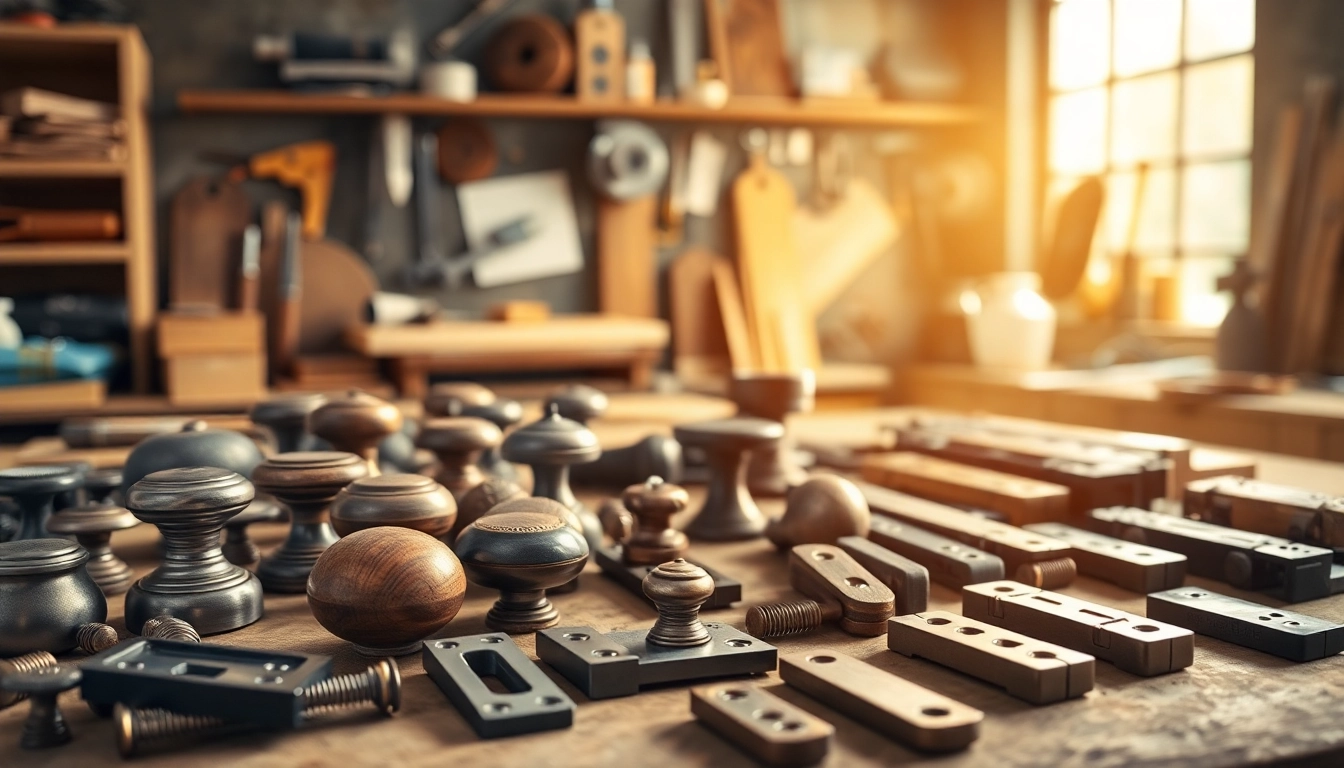Understanding the Role of Furniture Hardware Manufacturers
Furniture hardware manufacturers play a crucial role in the furniture and cabinetry industry by providing essential products that ensure functional and aesthetic quality. These manufacturers supply a vast range of components, including hinges, drawer slides, knobs, pulls, and various specialized hardware. Their offerings support both residential and commercial furniture needs while adhering to evolving consumer demands for design, functionality, and sustainability.
Whether you’re a homeowner looking to upgrade your furniture, a contractor sourcing parts for a large-scale project, or a designer aiming for the latest trends, understanding furniture hardware manufacturers is fundamental to achieving success in your project.
Types of Products Offered by Manufacturers
Furniture hardware manufacturers offer a diverse array of products tailored for various applications and styles. The most common types include:
- Hinges: Found in cabinet doors and other furniture, hinges can be concealed or visible, designed to provide different degrees of opening.
- Drawer Slides: Essential for smooth opening and closing mechanisms, drawer slides vary in types, such as side-mounted, under-mounted, and soft-close options.
- Cabinet Knobs and Pulls: Used for drawer and cabinet access, these come in varied designs, materials, and finishes to cater to different styles.
- Locks: Important for securing cabinets and furniture, locks enhance security and safety in home and office environments.
- Furniture Legs and Feet: Providing structural stability and aesthetics, furniture legs come in numerous designs tailored to diverse furniture types from sofas to tables.
Each product category is influenced by design trends and technological advancements, allowing manufacturers to implement innovation and functionality into their offerings.
Key Features to Consider in Hardware Selection
When selecting hardware, several key features can significantly influence performance and longevity:
- Material: High-quality materials such as stainless steel, brass, and zinc alloy offer durability and resistance to wear.
- Weight Capacity: Furniture hardware must be able to support the intended weight for optimal performance, especially for heavy-duty applications.
- Finish: The finish should not only enhance the aesthetic appeal but also provide protection against corrosion and tarnishing.
- Ease of Installation: Many manufacturers now offer products designed for quick and easy installation, lessening the chance of errors during assembly.
- Warranty: A solid warranty indicates confidence in product quality and offers peace of mind to the consumer.
Considering these factors can lead to a more satisfying outcome, ensuring that the chosen hardware not only meets but exceeds user expectations.
Importance of Quality Standards in Manufacturing
Adhering to recognized quality standards is essential for furniture hardware manufacturers. Compliance with national and international standards, such as ISO certifications, ensures that the manufactured goods meet specific criteria for safety, reliability, and efficiency.
Quality standards play a pivotal role in:
- Consumer Confidence: High-quality products build trust with customers, leading to repeat business and brand loyalty.
- Market Differentiation: Manufacturers that prioritize quality can differentiate themselves from competitors, offering a clear value proposition.
- Regulatory Compliance: Meeting industry regulations minimizes the risk of liabilities and enhances marketability.
- Quality Control Processes: Implementing strict checks during manufacturing ensures that defects are addressed before products reach the market.
In summary, maintaining high-quality standards greatly impacts both the manufacturer’s reputation and the end user’s satisfaction.
Top Furniture Hardware Manufacturers in the Industry
The furniture hardware industry is populated by a myriad of manufacturers, each providing unique products and catering to specific market segments. Here’s a look at some of the top names and what sets them apart:
Overview of Big Names in Furniture Hardware Production
Several established brands dominate the furniture hardware landscape:
- Top Knobs: Renowned for their extensive line of decorative cabinet and drawer hardware, Top Knobs infuses creativity into every piece, making them viable for a range of design tastes.
- Rockler: A trusted source for woodworkers, Rockler offers an expansive selection of hardware, including drawer slides and specialized components tailored for bespoke projects.
- Furnica: Known for their broad range of furniture accessories, Furnica continues to innovate by providing contemporary solutions, including specialized hardware like top cabinet lifts.
- Richelieu Hardware: As a market leader, Richelieu stands out with avant-garde designs and a commitment to providing versatile hardware solutions suitable for modern interiors.
- Häfele: This global player develops integrated hardware and lighting solutions, cementing its position in industries ranging from residential to hospitality.
These manufacturers not only lead in product offerings but also set trends within the furniture hardware space.
What Sets Leading Manufacturers Apart?
In a competitive market, several factors distinguish the top manufacturers from their peers:
- Innovation: Continual investment in research and development enables leading brands to deliver cutting-edge products and features that meet consumer needs.
- Customization: Offering customized solutions allows manufacturers to cater to unique projects and client specifications, enhancing satisfaction and relevance.
- Customer Service: Exceptional customer support before, during, and post-purchase guarantees a positive experience and fosters long-term relationships.
- Sustainability: Emphasizing environmentally friendly practices in sourcing and manufacturing aligns with growing consumer demands for sustainable living.
These characteristics are vital for manufacturers aiming to thrive in an ever-evolving marketplace.
Emerging Brands to Watch in Furniture Hardware
As the furniture hardware industry evolves, several emerging brands are making a name for themselves:
- Amerock: With innovative designs and offerings aimed at the modern consumer, Amerock captures a balance of luxury and affordability in cabinet hardware.
- CabinetParts.com: Focusing on a vast selection of hardware brands, they have carved a niche in providing comprehensive hardware solutions for contractors and homeowners alike.
- Hardware Resources: This company has developed a reputation for high-quality cabinet products, focusing on functionality and aesthetic appeal.
These rising stars explore new product lines and solutions aimed at enhancing user experience, offering exciting prospects for future trends.
Trends Shaping the Furniture Hardware Industry
The furniture hardware industry is constantly in flux, with several key trends driving change and innovation:
Design Trends Influenced by Consumer Preferences
As consumer tastes evolve, design trends in furniture hardware frequently shift, reflecting modern aesthetics:
- Minimalism: Simple yet elegant designs are gaining traction in response to consumer preferences for clean lines and functional beauty.
- Natural Finishes: A move toward organic materials and finishes, such as matte textures and earthy tones, aligns with a growing emphasis on nature-inspired interiors.
- Bold Statements: Unique and oversized hardware pieces are becoming focal points, adding personality and charm to furniture.
Understanding these shifts allows manufacturers to create products that resonate with consumers, ensuring relevance in the market.
Technological Innovations in Manufacturing Processes
Technological advancements are revolutionizing how furniture hardware is produced and delivered:
- 3D Printing: This technology allows manufacturers to quickly produce custom hardware solutions and prototypes, speeding up the design process.
- Smart Hardware: The rise of smart technology in home automation has seen the introduction of hardware designed to integrate seamlessly with smart home systems.
- Automation: Increased automation within manufacturing processes enhances efficiency and consistency, reducing production costs.
These innovations lead to more agile manufacturing practices and the ability to respond to market demands quickly.
Sustainability Practices Among Furniture Hardware Manufacturers
Sustainability is no longer optional; many furniture hardware manufacturers are prioritizing eco-friendly practices:
- Recycled Materials: Using recycled materials reduces environmental impact and appeals to environmentally conscious consumers.
- Energy-Efficient Production: Manufacturers are investing in energy-efficient technologies to minimize their carbon footprint during production.
- Responsible Sourcing: Transparency in sourcing materials emphasizes a commitment to ethical practices and sustainable relationships.
This trend not only enhances brand image but also meets consumer expectations for responsible purchasing.
Choosing the Right Hardware for Your Furniture Projects
Finding the right hardware can significantly influence the success of your furniture projects. Understanding your requirements is the first step to making informed decisions:
How to Assess Hardware Needs for Different Projects
Evaluating your hardware needs involves considering various factors:
- Project Type: Determine the scope and purpose of the project to identify necessary hardware types.
- Weight Considerations: Consider the load that various components will bear to select appropriate hardware for durability and safety.
- Style Alignment: Ensure that hardware complements the overall design theme of the furniture.
Meeting these criteria will lead to choosing effective hardware solutions tailored to your specific needs.
Matching Hardware to Your Design Aesthetic
Compatibility between hardware and design aesthetic is crucial for a cohesive look:
- Traditional vs. Modern: Choose hardware that aligns with the design era, whether choosing ornate knobs for traditional pieces or sleek pulls for modern furniture.
- Finish Harmony: Match hardware finishes with other furniture elements to create a unified appearance and avoid visual dissonance.
- Color Scheme Coordination: Consider the overall color palette. Hardware needs to either contrast pleasingly or blend seamlessly for desired effect.
This attention to detail will enhance not only functionality but also the overall appeal of your furniture.
Common Mistakes to Avoid When Selecting Hardware
Mistakes in hardware selection can lead to functional and aesthetic issues:
- Ignoring Weight Limits: Failing to consider weight capacity can lead to hardware failures, compromising safety and usability.
- Disregarding Compatibility: Ensure chosen hardware is compatible with the furniture design to avoid excessive modifications and repairs.
- Overlooking Quality: Skimping on hardware quality can lead to premature wear and dissatisfaction; investment in durable products pays off in the long run.
Avoiding these missteps results in a more seamless and successful furniture project, yielding higher satisfaction and durability.
Future Outlook for Furniture Hardware Manufacturers
The future of the furniture hardware industry appears promising as consumer preferences and market demands continue to evolve:
Emerging Markets and Consumer Demands
As globalization expands, emerging markets present new opportunities:
- Asia-Pacific Region: Rapid urbanization and a growing middle class in countries such as India and China allow for increased furniture production and demand for quality hardware.
- Eco-conscious Consumers: A rising tide of consumers prioritizing sustainability leads manufacturers to adapt by offering green alternatives.
- Customization Trends: Increased demand for personalized designs drives the need for hardware that caters to bespoke furniture solutions.
These shifts augment competitive strategies for manufacturers looking to thrive in a dynamic marketplace.
Adoption of Smart Hardware Solutions
The integration of smart technology presents further evolution in the furniture hardware sector:
- IoT Integration: Smart locks and systems allowing remote access combine convenience and security, catering to modern lifestyles.
- Automation and Smart Features: Products equipped with sensors and automated mechanisms offer enhanced functionality, increasing demand among tech-savvy consumers.
- User-friendly Apps: Apps facilitating furniture hardware management enhance user experience and add a layer of interactivity.
Embracing these technologies places manufacturers at the forefront of contemporary furniture design and innovation.
Predictions for Growth in the Industry
As industry trends unfold, several critical predictions are likely to shape the future landscape:
- Increased Demand for Sustainable Solutions: As eco-consciousness becomes mainstream, manufacturers adapting to these demands may experience accelerated growth.
- Technological Integration: Companies that embrace and integrate technology into their hardware products stand to gain competitive advantages and attract tech-savvy clients.
- Globalization of Product Offerings: Expanded international markets will continue to influence product adaptations and the introduction of diverse styles and solutions.
These predictions illustrate a positive trajectory for furniture hardware manufacturers, indicating a robust future for the industry amid changing consumer dynamics.



